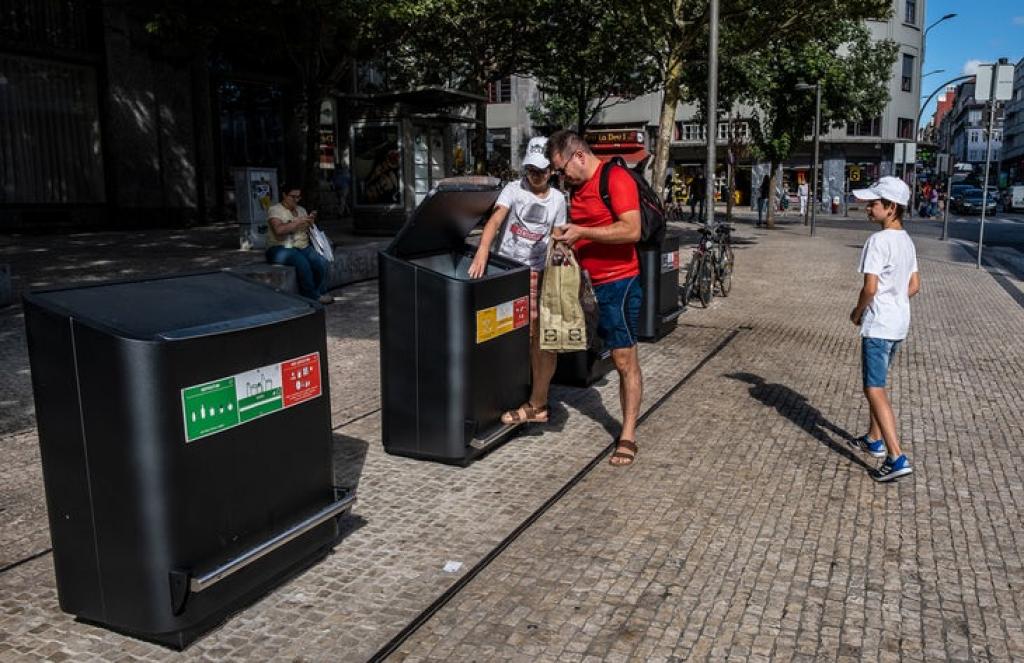Thessaloniki gets ready for its metro launch in November
The underground rapid transit lines have been under construction for almost two decades due to various project delays
 TheMayor.EU logo
TheMayor.EU logo 
Porto is leading the charge on sustainable waste management, Source: Porto Municipality/ Filipa Brito
In that respect, the city is one of Portugal’s leaders and a role model
Porto’s municipal website informed the public this week that the Portuguese city sent only 0.24% of its waste to landfills in 2020, thanks to the organized work and policies carried out by the municipal environmental company Porto Ambiente. The Municipality bases its waste management strategy on a zero-landfill policy, which is in line with European strategic guidelines, making it a leader and an outlier in that respect if we consider all of Portugal.
The numbers recorded by Porto Ambiente have favourably contributed to the results of the inter-municipal waste management company Lipor, which, according to data released by the Portuguese Environment Agency, reached the milestone of 2% of waste deposited in landfills.
Lipor is the Intermunicipal Waste Management Service of Greater Porto - founded in 1982. It manages, recovers, and treats the municipal waste produced in eight municipalities of the Greater Porto Area: Espinho, Gondomar, Maia, Matosinhos, Porto, Póvoa de Varzim, Valongo, and Vila do Conde. At the same time, it also shares good practices with the population, which are supported by awareness campaigns. The company treats half a million tons of municipal waste each year.
The numbers are remarkable because the national target for landfilling is 10%, making Lipor only one of two Portuguese waste management to meet that target and to do it in a consistent manner.
The Municipality of Porto has been achieving all the goals it set for itself and, in 2020, it reached a recycling rate of 37%, surpassing the established objective of 31%. Also, with regard to the production of selective waste, the rate is a bit over 65 kg/inhabitant per year, with the goal being 61 kg/inhabitant per year. That means that the progress is good but there is still some work to be done in the field of waste reduction per capita.

The underground rapid transit lines have been under construction for almost two decades due to various project delays

Now you can get your wine in Talence by paying directly in Bitcoin

That’s because the state has to spend money on updating the railway infrastructure rather than subsidizing the cost of the popular pass

Rethinking renewable energy sources for the urban landscape

The examples, compiled by Beyond Fossil Fuels, can inform and inspire communities and entrepreneurs that still feel trepidation at the prospect of energy transition

Now you can get your wine in Talence by paying directly in Bitcoin

The 10th European Conference on Sustainable Cities and Towns (ESCT) sets the stage for stronger cooperation between the EU, national and local level to fast track Europe's transition to climate neutrality.

At least, that’s the promise made by the mayor of Paris, Anne Hidalgo

The underground rapid transit lines have been under construction for almost two decades due to various project delays

At least, that’s the promise made by the mayor of Paris, Anne Hidalgo

Hostal de Pinós is located in the geographical centre of the autonomous region

Despite its church-y name, the district has long been known as the hangout spot for the artsy crowds

Urban dwellers across the EU are having a say in making their surroundings friendlier to people and the environment.

Forests in the EU can help green the European construction industry and bolster a continent-wide push for architectural improvements.

Apply by 10 November and do your part for the transformation of European public spaces

An interview with the Mayor of a Polish city that seeks to reinvent itself

An interview with the newly elected ICLEI President and Mayor of Malmö

A conversation with the Mayor of Lisbon about the spirit and dimensions of innovation present in the Portuguese capital














